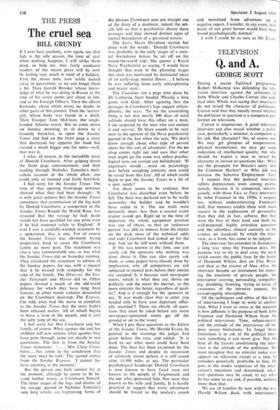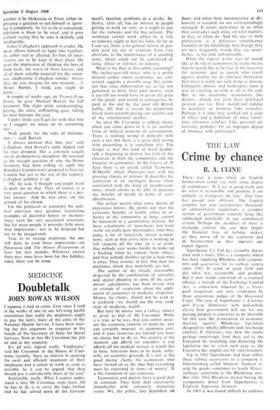TELEVISION
Q. and A.
GEORGE SCOTT
During a recent Talkback programme, Robert McKenzie was defending the tele- vision interview against the criticisms of John Whale and Charles Curran (the poli- tical one). Whale was saying that interviews do not reveal the character of politicians. Curran said that they merely reveal whether the politician in question is a competent per- former on television.
Curran is ungenerous. A good television interview can also reveal whether a politi- cian, particularly a minister, is competent at his job. But character? No, of course not. We may get glimpses of temperament, physical mannerisms; we may get some indication of intellectual quality; but why should we expect a man to reveal his character in answer to questions like: What are the prospects for Britain's entry into the Common Market? or Why did you increase the Selective Employment Tax?
I suspect that the political interview suffers depreciation, even among profes- sionals, because it is compared, uncons- ciously, with those Face to Face interviews by John Freeman in the 1950s. I suspect. too, without underestimating Freeman's 'skill, that memory credits them with more success in the exploration of personality than they did, in fact, achieve. But they were the first of their kind and both the well-prepared, highly articulate questions and the relentless, clinical curiosity of the camera set standards by which the inter- view, as a form, has come to be judged.
The interview has extended its boundaries a long way since the Freeman days. His purpose was to try to peel away the mask which covers the public face. In the hands of Desmond Wilcox, first on This Week. and then as the creator of Man Alive, the interview became an instrument for expos- ing the emotions of private people; the interviewer coaxing, persuading, sympathis- ing, prodding, listening, trying to erase all awareness of the intrusive camera, the eavesdropping microphone.
Of the techniques and ethics of this kind of interviewing I hope to write at another time. What I want to stress at the moment is how different is the purpose of both John Freeman and Desmond Wilcox from the political interviewer. Time, subject-matter and the attitude of the interviewee all im- pose severe limitations. To forget those limitations is to ask of the political inter- view something it can never give. Not the least of the factors conditioning the inter- view is the attitude of the politician. We must recognise that no minister today ever appears on television except at a time he considers potentially profitable to him. He goes to the studio suspicious of the inter- viewer's intentions and determined, what- ever questions may be asked, to say what he has come to say and, if possible, nothing more than that.
We are all familiar by now with the way Harold Wilson deals with interviewers, whether it be McKenzie or Frost, either re- phrasing a question to suit himself or ignor- ing it completely. So far as he is concerned, television is there to be used, and it goes without saying that he uses it skilfully and intelligently.
James Callaghan's approach is cruder. He never allows himself to lapse into familiar- ity, either real or affected. To him all inter- viewers are to be kept in their place. He gives the impression of thinking the best of them fools, the worst of them knaves, and all of them suitable material for the sonor- ous, elephantine Callaghan rebuke. Mister Day, do you imagine for one moment ...? Mister Burnet, I think you ought to know ...
A couple of weeks ago, on Twenty-Four Hours, he gave Michael Barratt the full treatment. The slight smile, condescending, pitying, the stern, unflinching gaze, taking his man between the eyes.
'I don't think you'll get far with that line so I suggest we move on to something else . .
'Well, purely for the sake of informa- tion—', said Barratt.
'I always mistrust that line, too,' said Callaghan. And Barratt's smile slipped and his eyes dropped, like a con-man caught out in an elementary deception. He resorted to the straight question of why the Home Secretary had been willing to apply the Boundary Commission's proposal to Greater London but not to the rest of the country. Callaghan gobbled it up.
`Ah,' he said, 'I thought you might want to push me on that. That, of course, is a very good question to which there is a per- fect answer.' And he was away on the ground of his choice.
For the politician or journalist the poli- tical interview may produce fascinating examples of doctrinal heresy or inconsis- tency, even the very occasional sensation. But for most people it provides little more than impressions: not to be despised but not to be exaggerated.
True to its strange traditions, the BBC will deny us even those impressions—on Panorama and The Money Programme at least—for two months. Whatever excuse there may once have been for this holiday, today there can be none.



































 Previous page
Previous page